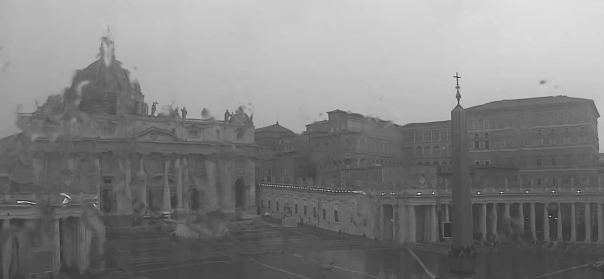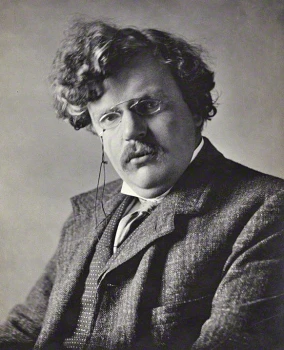
Songs pour forth amidst raindrops,
guardian Apostles moved by every tear from above,
solemnly cleansing.Broad fields of wet cobblestone
allowing saints and spirits
to pass unhindered in service to our King
who stays with us.

Songs pour forth amidst raindrops,
guardian Apostles moved by every tear from above,
solemnly cleansing.Broad fields of wet cobblestone
allowing saints and spirits
to pass unhindered in service to our King
who stays with us.
From treasure trove of Tolkien:
This thing all things devours:
Birds, beasts, trees, flowers;
Gnaws iron, bites steel;
Grinds hard stones to meal;
Slays king, ruins town,
And beats high mountain down.
Do you know what it is?
Oh, the slap-stick comedy
from the Brothers Marx
to the Stooges Three,
all along the Fields of W.C.
even to Laurel and Hardy.

Calling upon that bastion of wit himself, Mr. G. K. Chesterton:
“I agree with the realistic Irishman who said he preferred to prophesy after the event.” – Illustrated London News, Oct. 7, 1916

To kick off this series, let’s start at the very beginning:
The beginning of eternity
The end of time and space
The beginning of every end,
And the end of every place.
I can’t believe it
I look out
At the leaves
They’re green again
And I bet
That when I look again
They’ll be colored
Then carmelized to brown
Until they’re gone
Then round and back again
Pacing, ever quicker
Quicker, I can’t believe it
Quicker, can I peer closer
Quicker, can I take in its beauty?
Quicker, until I stand
Against the glass
For an instant
I see the colors
But staring back
I see
not leaves but me
contrasted grey
Wit is often best served as a cocktail, quick and to the point.
XVI – TO AVITUS
Of the epigrams which you read here, some are good, some middling, many bad; a book, Avitus, cannot be made in any other way.
I know, my friends, it has been long…but not too long: let’s begin
How hard to stretch the mind to higher cause
And art’s true virtues into life imbue
By holding tight to breath and breadth impart
To naught but heart and minds purview
And to keep that realm amidst the tattered throes
of friend and foe alike who do not know
what glory seen amidst the vaulted
rise, ethereal interior skies
How hard to keep aloft what naught
but soul and mind sustain
like transparent scaffolds, limbs remain
to uphold with airy force what little more
than butterfly wings could destroy
But that they may gaze upon the truth
of such beauty rarified;
it exists! And so I must in you,
my friend, confide to save
this world, I give my back.
I Atlas
and you
my world
Simple! It’s Monday: I give you a riddle, you try to solve it!
(Hint Hint: It will deal with the themes of the previous week. Comment to guess the answer!)
But try do I to count that which
the human race’s future dreads
as little more than I can fathom
sideways blows the paper shreds.
Who am I?
Continuing where we left off, taking the molecule and delving deeper to the core. I’ve just finished research on the intriguing development of the first nuclear reaction, from its brain child in the first Solvay conferences, to its materialization (or more appropriately, de-materialization) in the form of the trinity test. Side note that I’ve never liked how science, news, or pop culture have utilized religious nomenclature to apply to secular things. It has always bothered me.
Sophomore: But hey hypocrite, you were comparing molecules to angels and the Trinity in the last post! And you just stole “nomenclature” from the pagan Romans.
Me: Step off son, we put the Holy in Holy Roman Empire. Just listen to my boy Athanasius… *hands-off mic* (24 min rap solo by Athanasius Kircher.) “We Put the Holy in Your Holiday” single, in stores Dec 1st.
Wow, I was going to have this post be all somber and dark, quick in quick out, but it’s morphed for sure.
Snapping back to reality; that’s how I feel about the name of the trinity test. But the thing that intrigued me was Oppenheimer’s inspiration for naming the test “trinity” . For even he, as he was experimenting with the powers of the universe, could discern from what source the powers came. That he was witnessing it. Understanding it. Materializing it.
Would not God, who let the hand of Thomas touch His hands and side
let those probe the depths of the heavens, read the rays of the skies
just so that they might know and believe in Him?
Oppenheimer’s test codename was sourced from John Donne’s poem. (Yes, the same John Donne gave Hemingway the line “For whom the bell tolls”.) The sonnet below:
Batter my heart, three-person’d God, for you
As yet but knock, breathe, shine, and seek to mend;
That I may rise and stand, o’erthrow me, and bend
Your force to break, blow, burn, and make me new.I, like an usurp’d town to another due,
Labor to admit you, but oh, to no end;
Reason, your viceroy in me, me should defend,
But is captiv’d, and proves weak or untrue.Yet dearly I love you, and would be lov’d fain,
But am betroth’d unto your enemy;
Divorce me, untie or break that knot again,
Take me to you, imprison me, for I,
Except you enthrall me, never shall be free,
Nor ever chaste, except you ravish me.
The sonnet is so complex in its inter-phrase rhythm, patterned rhyme, and symbolic nouns. It by its constituent parts can be subject to utter academic and scholarly scrutiny and made into endless typologies. Why? Because the crafting of a sonnet is an art. The art of mapping the complexity of rhyme and rhythm with the symbolic nouns and adjectives.
But probe the depths even deeper. See what inspired him to choose Donne’s poem in the first place. Remorse. Repentance. The need to be built up again. Acknowledging the power of God is beyond our power, and earthly powers because it is He that wrought them all.